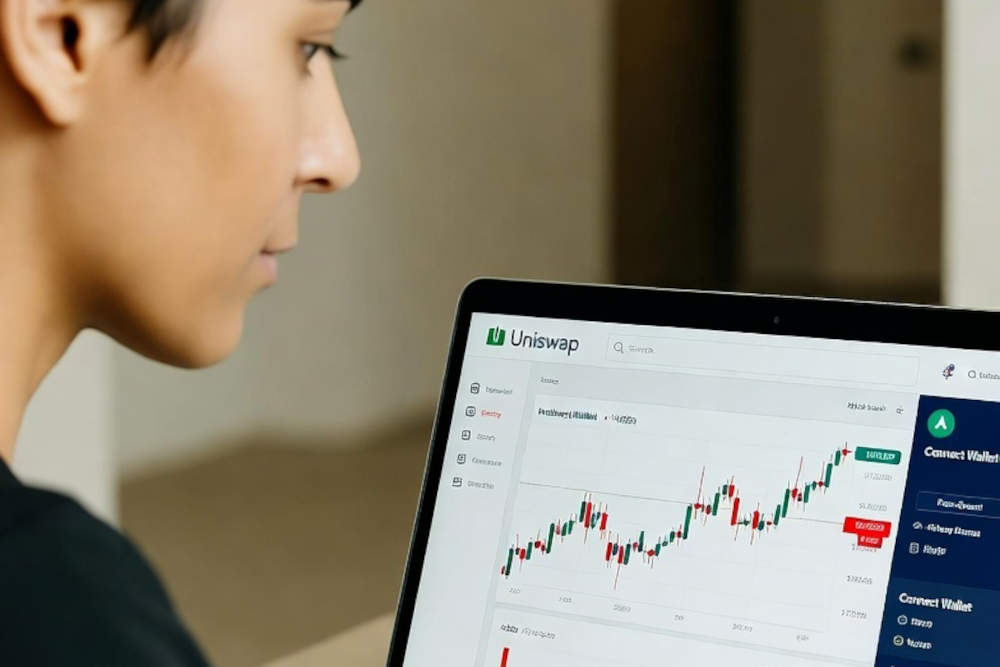
Decentralized exchanges (DEXs) continue to be a core pillar of decentralized finance (DeFi), offering users non-custodial, peer-to-peer trading of tokens without relying on centralized intermediaries. While Uniswap remains a dominant force, the DEX ecosystem has matured significantly — offering a range of alternatives with unique advantages. In this article, we’ll explore why you might want to consider an alternative to Uniswap, review the top options available today, and provide guidance on how to choose the right DEX for your needs.
Panaprium is independent and reader supported. If you buy something through our link, we may earn a commission. If you can, please support us on a monthly basis. It takes less than a minute to set up, and you will be making a big impact every single month. Thank you!
Why Consider an Alternative to Uniswap?
Even though Uniswap is widely used and trusted, there are several reasons an investor or trader might seek alternatives:
-
Fees & gas costs: Depending on the network and version of Uniswap you’re using, transaction fees (especially on Ethereum mainnet) can be high. Alternatives may offer lower costs or be built on chains with cheaper gas.
-
Chain / asset support: Some DEXs operate on multiple chains (BSC, Avalanche, Solana, etc.) or support niche token sets that Uniswap may not list.
-
Features & incentives: Some platforms provide enhanced yield farming, liquidity incentives, or innovative pool mechanics.
-
Slippage, routing & efficiency: With growing competition, DEX aggregators and specialized AMMs sometimes offer better routing, lower slippage, or improved execution for particular trades.
-
Risk diversification: Using multiple DEXs can mitigate platform-specific risk (e.g., downtime, hacks, smart-contract bugs).
So, while Uniswap remains strong, looking at alternatives helps you optimize cost, access, and features.
What Makes a Good DEX?
When evaluating DEX alternatives, consider these key criteria:
-
Security & audit history – Smart-contract audits, past performance, and platform longevity matter.
-
Liquidity & volume – More liquidity means better execution, less slippage.
-
Fee structure & gas efficiency – Lower fees improve user experience, especially for smaller trades.
-
Multi-chain support / token coverage – Ability to trade across chains or find niche tokens.
-
User interface & routing efficiency – Aggregation, price-impact minimization, good UX.
-
Incentives / yield for liquidity providers (LPs) – If you want to provide liquidity, rewards matter.
-
Regulation & jurisdiction risk – Some platforms may face regulatory headwinds depending on chain or region.
With that in mind, let’s dive into the best alternatives to Uniswap in 2025.
Top Uniswap Alternatives
1. SushiSwap

-
Built originally as a fork of Uniswap, SushiSwap offers a similar AMM model with added features such as yield farming, staking of its governance token (SUSHI), and more aggressive liquidity incentives. (Blocktrade)
-
Pros: Established platform, multi-chain support (Ethereum, Polygon, etc.), additional rewards.
-
Cons: Slightly smaller liquidity than Uniswap; risks tied to tokenomics and incentive models.
-
Use case: If you’re a liquidity provider looking for yield plus trading, SushiSwap is a strong pick.
2. PancakeSwap


-
Operating mainly on Binance Smart Chain (BSC) and other chains, PancakeSwap offers lower fees and many gamified features (lottery, collectibles, etc.). (Wikipedia)
-
Pros: Very strong on BSC in terms of volume and liquidity; low transaction costs; engaging UI.
-
Cons: Being on BSC means somewhat different ecosystem/risks; may have less of the Ethereum-DeFi integrations.
-
Use case: Ideal for users comfortable on BSC seeking cheaper trades, fun features, and yield farms.
3. 1inch (Wallet & Aggregator)

-
1inch isn’t just a DEX; it is a DEX aggregator which sources liquidity across multiple exchanges and routes trades for best execution. (Alchemy)
-
Pros: Excellent for finding optimal rates, reducing slippage, and accessing various DEXs via one interface.
-
Cons: Possibly more complex for beginners; focuses on routing/trading rather than providing liquidity.
-
Use case: Traders seeking best possible price across chains, or those doing frequent swaps.
4. Curve Finance

-
While not a full “Uniswap style” general token DEX, Curve specializes in stablecoin and low-volatility swaps with minimal slippage. (wundertrading.com)
-
Pros: Extremely efficient for stablecoin swaps; low slippage; yield opportunities for LPs.
-
Cons: Less suitable for novel token pairs or general token swaps outside stablecoins.
-
Use case: If you frequently swap stablecoins or want liquidity for them, Curve is a strong choice.
5. KyberSwap / Kyber Network



-
Kyber Swap acts as a multi-chain DEX and aggregator that sources liquidity from many chains and DEXs. (defiprime.com)
-
Pros: Multi-chain, good routing, mix of AMM + aggregator features.
-
Cons: Volume may be lower than the largest DEXs; still competition with major aggregators.
-
Use case: For users who trade across chains and want flexibility.
How to Choose the Right DEX for You
Here’s a checklist to help you evaluate and pick the right alternative:
-
Transaction size & frequency: For small trades, low-fee chains or aggregators matter.
-
Chain ecosystem: Are you working primarily on Ethereum? BSC? Avalanche? Choose a DEX strong on your chain.
-
Token pairs: Some DEXs may list niche or new tokens that Uniswap might not.
-
Liquidity needs: Check pool sizes; low liquidity = high slippage.
-
Yield opportunities (if LPing): If you’ll provide liquidity, compare incentivization programs.
-
Security & track record: Has the platform had vulnerabilities or exploits?
-
User interface & complexity: Aggregators may offer best price but more complexity.
-
Gas & fees: Especially important on Ethereum-mainnet; alternatives may save you a lot.
-
Interoperability & chain bridging: If you plan to swap across chains, multi-chain DEXs/aggregators are beneficial.
Future Trends & What to Watch
-
Multi-chain expansion: More DEXs supporting many chains, not just Ethereum.
-
Hybrid models: AMM + order-book hybrids may provide better price discovery and efficient routing.
-
Layer-2 adoption: As L2s (Arbitrum, Optimism, Base) grow, DEXs on those layers may offer lower fees and faster trades.
-
Aggregator dominance: More focus on aggregators that pull liquidity and optimize swaps across many platforms.
-
Deeper integrations: Wallets, smart-routing bots, better UI/UX for non-technical users.
-
Governance and tokenomics: Platforms offering native tokens with staking, governance, and yield can attract users.
-
Security & regulation: Regulatory clarity for DEXs is improving, but audits, decentralization and design remain critical.
Final Thoughts
If you’ve been using Uniswap exclusively, it’s a good idea to explore some of these alternatives. They can offer lower fees, better routing, chain-diversity, and unique features depending on your trading or liquidity-providing goals. Whether you’re a trader looking for best execution or a liquidity provider seeking yield, the best DEX for you will depend on your specific needs.
By using the evaluation checklist above and experimenting with 1-2 strong alternatives (e.g., SushiSwap for yield, 1inch for routing, PancakeSwap for cost-efficient chain swaps), you’ll be better positioned to optimize your DeFi experience.
Was this article helpful to you? Please tell us what you liked or didn't like in the comments below.
Disclaimer: The above content is for informational and educational purposes only and does not constitute financial or investment advice. Always do your own research and consider consulting with a licensed financial advisor or accountant before making any financial decisions. Panaprium does not guarantee, vouch for or necessarily endorse any of the above content, nor is responsible for it in any manner whatsoever. Any opinions expressed here are based on personal experiences and should not be viewed as an endorsement or guarantee of specific outcomes. Investing and financial decisions carry risks, and you should be aware of these before proceeding.
About the Author: Alex Assoune
What We're Up Against
Multinational corporations overproducing cheap products in the poorest countries.
Huge factories with sweatshop-like conditions underpaying workers.
Media conglomerates promoting unethical, unsustainable products.
Bad actors encouraging overconsumption through oblivious behavior.
- - - -
Thankfully, we've got our supporters, including you.
Panaprium is funded by readers like you who want to join us in our mission to make the world entirely sustainable.
If you can, please support us on a monthly basis. It takes less than a minute to set up, and you will be making a big impact every single month. Thank you.



















0 comments